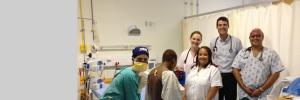
Epidural service quadruples in two years
Epidural anaesthesia has become a popular and effective form of pain relief during childbirth. However, this service is not readily available in public sector hospitals in South Africa, where natural birth with minimum intervention is the norm.
Specialists at Stellenbosch University's Faculty of Medicine and Health Sciences (FMHS) and Tygerberg Hospital (TBH) understood the need to expand the obstetric epidural service offered at TBH to benefit both patients and specialists in training.
In June 2014, a new epidural service was introduced at the hospital and since then more than 700 epidurals have been administered to patients. The new service delivery model was developed under the supervision of Dr Jonathan Burke, a medical specialist in the Department of Anaesthesiology at TBH.
In the past, only approximately 150 epidural procedures per year were administered to patients at TBH, mainly due to a lack of resources. The service was reserved for patients not able to deliver without an epidural procedure because of certain medical conditions.
"Today, we are able to include more patients with a wider variety of indications for epidural analgesia," says Dr Adele de Goede, a medical specialist at TBH. Patients in labour in need of an epidural - who did not qualify under the previous protocols – are now more likely to have a normal vaginal birth with the help of an epidural due to the increased availability of the procedure. "This holds a number of benefits to both mother and baby and also decreases the caesarean rate at the hospital."
The clinical offering in postgraduate training in anaesthesiology was expanded significantly with the new service. Registrars in the Department of Anaesthesiology are exposed to a variety of obstetric conditions during the one month rotation on the epidural service under supervision of medical specialists in the department. "This adds to the wealth of their experience," says De Goede.
Photo: Administering an epidural in the labour ward, are Dr Lauren Joseph, the patient, Dr Karen Strauss, Sr Elna de Goede, Dr Jonathan Burke and Dr Justin Kling.
